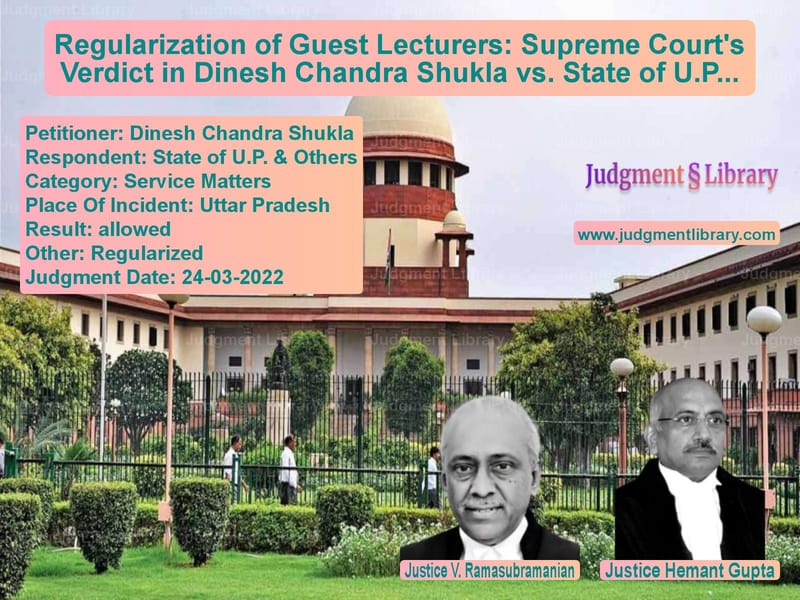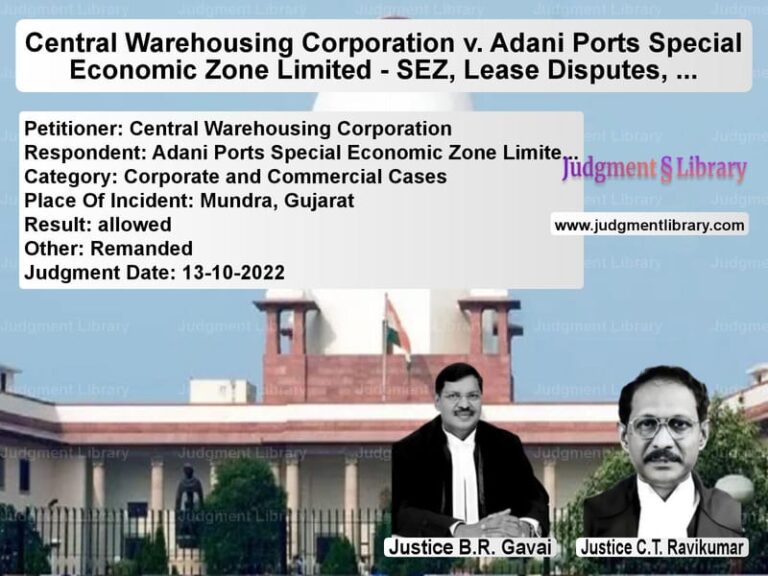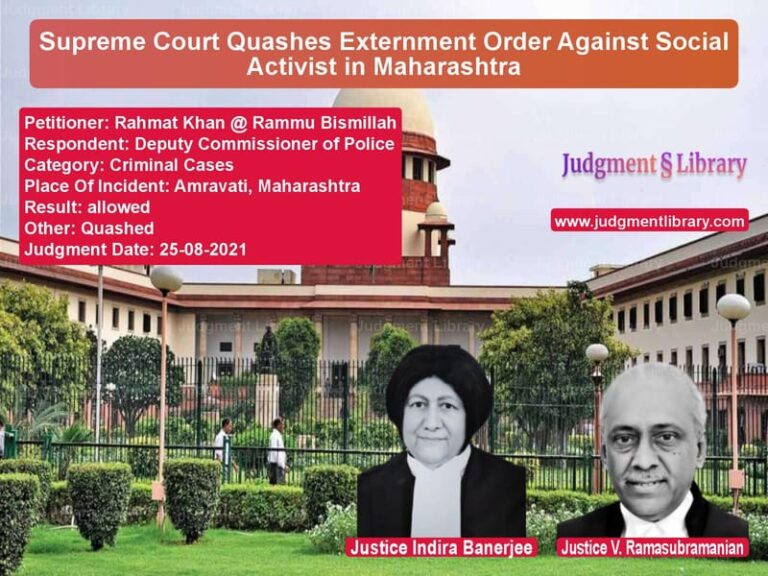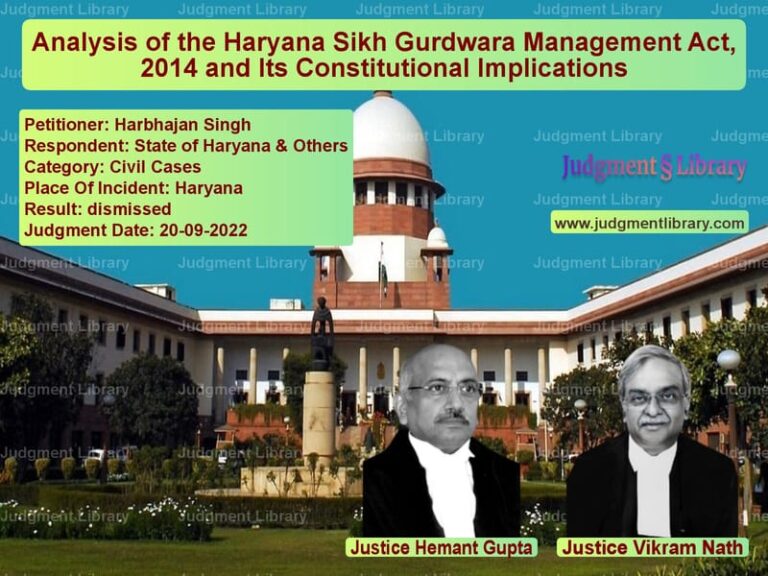Regularization of Guest Lecturers: Supreme Court’s Verdict in Dinesh Chandra Shukla vs. State of U.P.
The Supreme Court of India recently ruled in favor of Dinesh Chandra Shukla, a guest lecturer at Mahatma Gandhi Kashi Vidyapeeth University, who had been denied regularization despite teaching for over 16 years. The case highlights crucial legal issues concerning employment rights, university recruitment policies, and administrative fairness. The verdict underscores the need for consistency in educational employment policies and protection of long-serving contractual employees.
Background of the Case
The appellant, Dinesh Chandra Shukla, was engaged as a guest lecturer to teach Karm Kand (ritualistic scriptures) at the university’s Department of Sanskrit. His service conditions were highly restrictive:
- Paid only Rs. 250 per lecture with a maximum of Rs. 5000 per month.
- Engaged since 2006, yet denied a permanent position despite multiple vacancies.
- The university had issued Advertisement No. 2 of 2006 for the regular appointment of a Lecturer in Karm Kand.
The selection process was derailed due to interference from the Chancellor and Vice-Chancellor, leading to a long legal battle. The appellant was selected by the Selection Committee, but his appointment was annulled by the Chancellor. This prompted the appellant to seek legal recourse.
Legal Issues Considered
- Whether the Chancellor’s decision to reject the Selection Committee’s recommendation was legally valid.
- Whether the qualifications required for the post of Lecturer in Karm Kand were sufficiently defined.
- Whether the appellant, having served for 16 years as a guest lecturer, was entitled to regularization.
- The implications of the absence of subject experts in Karm Kand in the selection process.
Petitioner’s Arguments (Dinesh Chandra Shukla)
- The Executive Council had initially approved his selection, but administrative interference led to the rejection.
- The university had no statutory provision specifying a Master’s degree in Karm Kand, making the Chancellor’s objection baseless.
- For 16 years, he had been the only one teaching Karm Kand, which proves his competence and necessity in the university.
- Other universities like Banaras Hindu University and Sampurnanand Sanskrit University recognized Karm Kand as a part of Sanskrit studies, supporting his eligibility.
- The Chancellor acted arbitrarily, rejecting the selection process without adequate reasoning.
Respondent’s Arguments (State of U.P. & University)
- The Selection Committee had not included subject experts in Karm Kand.
- The university statutes did not recognize Karm Kand as an independent subject; hence, his selection was invalid.
- The Chancellor was within his rights to reject the appointment due to procedural flaws.
- The High Court had upheld the Chancellor’s decision, validating the rejection.
Supreme Court’s Observations
- Arbitrariness in Recruitment Process: The Court noted that the appellant was caught in an administrative battle between the Chancellor and the Vice-Chancellor.
- Lack of Subject Experts: Since no university in India offered a postgraduate degree in Karm Kand, the requirement for subject experts was impractical.
- Contradictory Stand of the University: The same university had engaged the appellant for 16 years to teach Karm Kand but later denied him appointment on the grounds of insufficient qualifications.
- Employment Fairness: The Court emphasized that an individual teaching a subject for over a decade without complaints should not be denied regularization based on administrative technicalities.
The Court stated:
“It is time for the University to put an end to this ‘Yuddh Kand’ and allow the appellant to move from ‘Karm Kand’ to ‘Karm Phal Kand’.”
Final Judgment
- The appeal was allowed, and the High Court’s order rejecting the writ petition was set aside.
- The university was directed to regularize the appellant’s services immediately.
- The judgment recognized that a candidate should not suffer due to the administrative failures of the institution.
Key Takeaways from the Judgment
- Guest lecturers cannot be denied regularization arbitrarily: If an individual has been teaching for a prolonged period, they must be considered for permanent employment.
- Universities must define qualifications clearly: The absence of a specified postgraduate degree in Karm Kand should not have been used as a ground for rejection.
- Fairness in recruitment processes: Administrative hurdles should not prevent deserving candidates from being appointed.
- Judicial protection of employment rights: Long-serving contractual employees must not be treated as disposable.
Conclusion
The Supreme Court’s decision in this case is a landmark ruling in favor of contractual employees in the education sector. It highlights the importance of ensuring fair employment policies, preventing administrative bias, and recognizing long-serving educators’ contributions. By directing the university to regularize the appellant’s services, the Court reinforced the principle that individuals who dedicate years to teaching must be granted employment security.
Petitioner Name: Dinesh Chandra Shukla.Respondent Name: State of U.P. & Others.Judgment By: Justice V. Ramasubramanian, Justice Hemant Gupta.Place Of Incident: Uttar Pradesh.Judgment Date: 24-03-2022.
Don’t miss out on the full details! Download the complete judgment in PDF format below and gain valuable insights instantly!
Download Judgment: dinesh-chandra-shukl-vs-state-of-u.p.-&-othe-supreme-court-of-india-judgment-dated-24-03-2022.pdf
Directly Download Judgment: Directly download this Judgment
See all petitions in Employment Disputes
See all petitions in Recruitment Policies
See all petitions in Public Sector Employees
See all petitions in Termination Cases
See all petitions in Pension and Gratuity
See all petitions in Judgment by V. Ramasubramanian
See all petitions in Judgment by Hemant Gupta
See all petitions in allowed
See all petitions in Regularized
See all petitions in supreme court of India judgments March 2022
See all petitions in 2022 judgments
See all posts in Service Matters Category
See all allowed petitions in Service Matters Category
See all Dismissed petitions in Service Matters Category
See all partially allowed petitions in Service Matters Category







